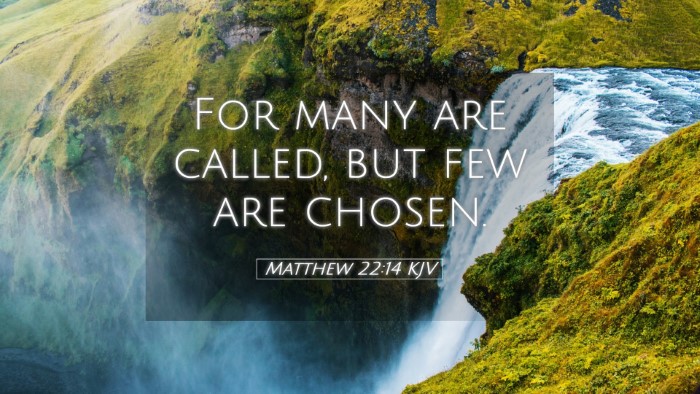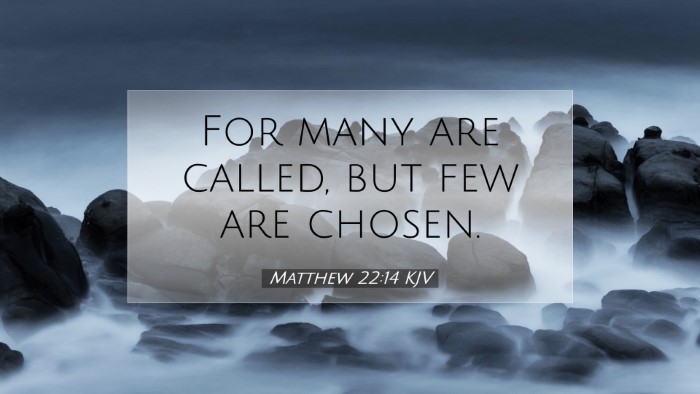Matthew 22:14 Commentary
"For many are called, but few are chosen." (Matthew 22:14)
This verse concludes the parable of the wedding feast, which Jesus uses to illustrate the nature of God's kingdom and the response of humanity to His invitation. The parable speaks volumes about divine election, grace, and human agency.
Context of the Verse
In the preceding verses (Matthew 22:1-13), Jesus narrates the story of a king who prepares a banquet for his son. When the invited guests refuse to come, the king sends his servants to bring in anyone they find. This invitation extends beyond the originally chosen, indicating a shift in God’s dealings with Israel and the extension of grace to the Gentiles.
The Call and the Chosen
This verse succinctly expresses a crucial theological principle: the distinction between those who are called by God and those who ultimately accept and fulfill the conditions placed upon such a call.
- Matthew Henry: Henry emphasizes that the calling refers to God's universal offer of salvation. The "many" signifies all who are invited to partake in God's kingdom. However, the "few" denotes those who accept this invitation sincerely and faithfully, highlighting the serious nature of genuine discipleship.
- Albert Barnes: Barnes points out that the call goes out to a wide audience, but the choice of the 'few' reflects divine sovereignty. He asserts that human response plays a pivotal role in acceptance, implying that not everyone who hears the call will grasp its significance or respond appropriately.
- Adam Clarke: Clarke draws attention to the implications of being 'chosen.' He sees the election as revealing God's grace and mercy but also stresses the necessity of personal conviction and commitment. He underscores the importance of not just being called but also living in accordance to the call received.
Theological Implications
The statement "many are called, but few are chosen" can lead to extensive theological discussion regarding predestination and free will. It identifies God’s intention to welcome all ("the many") while simultaneously recognizing that only some respond adequately ("the few").
- Predestination: This verse can tie into discussions on predestination, suggesting that God's choosing is not arbitrary; rather, it follows a divine plan that aligns with His justice and mercy.
- Free Will: The parable illustrates human responsibility in responding to God's invitation. While God calls many, it is up to the individual to respond positively and to live out their faith.
- Grace: The implication of grace is tremendous. God's call is seen as an act of grace, providing opportunity for salvation to all, yet it is sobering to note that some will dismiss this gift.
Application for Ministers and Theologians
This verse calls for reflection on the nature of ministry and evangelism. Pastors and theologians are reminded of the importance of laboring to bring forth the Gospel invitation, knowing that responses will vary.
- Emphasis on Evangelism: Church leaders should focus on outreach, understanding that many are receptive but few may truly commit. The challenge is to nurture genuine faith among those who are called.
- Discipleship and Accountability: It is critical for those who are in ministry to remember that the true measure of being 'chosen' involves bearing fruit in accordance with one’s faith, thus fostering community accountability in the body of Christ.
- Encouragement for the Faithful: For believers, being among the 'chosen' should encourage a posture of humility and gratitude, recognizing that they have responded to God's grace.
Conclusion
Matthew 22:14 serves as a poignant reminder of the dual nature of God's invitation. The tension between divine sovereignty and human responsibility encapsulated in this verse calls people of faith to examine their own responses to God's call, prompting them to align their lives with His will.
In summary, the insights from Henry, Barnes, and Clarke converge on the understanding that while God invites many to His banquet, it is the faithful response of the heart that ultimately determines who is chosen. This reality reinforces the call for ongoing reflection, evangelism, and above all, a deep, abiding commitment to live out the implications of Christ's invitation in our lives.


